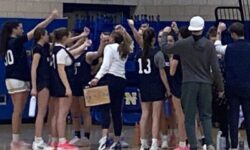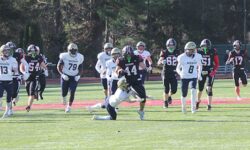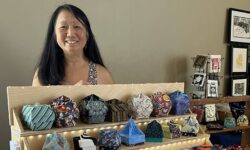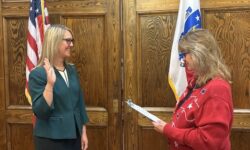[ccfic caption-text format="plaintext"]
By Stephen Press
Hometown Weekly Staff
The students of the Pollard Middle School eighth-grade social studies class slumped in their desks, some still wiping the sleep from their eyes. It was a typical scene that plays out daily in every classroom across the country. First period, it seems, is a perpetual battleground between the waking and sleeping worlds, a time of the day when students are most likely to succumb to a combination of their own early morning apathy and exhaustion. Today, however, a change in routine raised some of the drooping eyelids.
This morning's class would not be taught by Ms. Gillespie, but by State Representative Denise Garlick. Rep. Garlick, accompanied by Chief of Staff Amanda Bernardo and Research Analyst Rob Reed, had come to explain how a bill becomes a law. It was a lecture she was uniquely qualified to give, and one she handled with aplomb.
The lesson, however, went far beyond such procedural matters. At its heart, this was a lesson about the importance of participation in democracy.
"I believe that this is one of the most important things that I do," the Representative said to Ms. Gillespie's class as she launched into a discussion that touched on everything from the importance of service to the inherent transparency in the legislative process to the dangers of voter apathy.
"How many people in this room think that someday they might like to run for office or be engaged in public service?" Rep. Garlick asked.
A single hand, belonging to a student named Nate, went up.
"Nate," said Rep. Garlick, "I ask that question to every single classroom I've been to in the eighth grade. If I'm really lucky, there's one 'Nate' in the room. Sometimes, some rooms have two. Most rooms don't have any." She paused for a moment to ask another question:
"Why not? We're good people. We have a great job. It makes a difference. We're proud of our work. What are you hearing about people who run for office?"
"You two may be great people," another student somewhat sheepishly responded to Rep. Garlick and her Chief of Staff, "but others might not be so great…"
"How would you know that?"
"The news, the media," the student trailed off.
Rep. Garlick confronted the issue head-on. "We're hearing that people are refusing to do work, we're hearing that people are disagreeing with each other. We're hearing that it's pretty rough in public service these days," she said. "Not only are we painting public office and elected people, but everybody else around who's also involved with the government, with that same kind of brush. A negative brush," she said.
"When I was in the 8th grade, we were just at the very end of the Vietnam war. John Kennedy had been president and he said 'Ask not what your country can do for you, ask what you can do for your country.' That's history to you - that was my life," she told the room.
"People who were 8th graders were taking the Purple Line into Boston and demonstrating against the Vietnam War. People believed they had the power. No matter what side of the issue you were on, you believed you had the power, and you could change what was happening in the country."
"The American people," she pointed out, "stopped the Vietnam War. It didn't stop from the top down, it stopped from the ground up."
She then pivoted to the present.
"We are being given messages that there's nothing we can do. How many people have heard the most negative message you can ever hear: 'your vote doesn't count'? That is the most dangerous message that you'll ever be given in your entire life."
Beyond imparting the substance of her civics lesson, Rep. Garlick accomplished something that was perhaps equally (if not more viscerally) relevant. By appearing in Ms. Gillespie's classroom, she managed to humanize government in a way that her students had perhaps not experienced before. In an era in which our most high-profile politicians sometimes seem to have as much in common with the Kardashians as the Kennedys, it appeared oddly jarring for the students to share the room with an elected official. Indeed, that seemed to be part of the point.
Far removed from the public figures that dominate our national discourse and news media, Rep. Garlick came off as approachable and distinctly "Needham" in her class presentation. It was a point that was not lost on the students. Or their teacher, for that matter.
"In class, we spend a lot of time on current events in an effort to empower the students to feel like a part of their community," said Ms. Gillespie towards the end of the lecture. "Rep. Garlick coming is just another step in that empowerment."
"I think our young people’s power is being stolen by the intended and unintended conversations of frustrated and disillusioned adults, entertainment masquerading as news and the complacency of adopted cynicism," said the State Representative as the students, far more awake than they had been just an hour earlier, made their way to their next classes. "I believe that what I'm trying to do is help these students know they have power as American citizens."






















